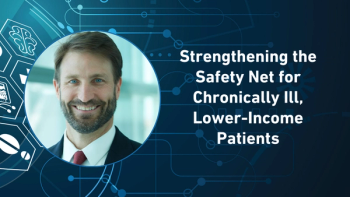
- Pharmaceutical Commerce - October 2023
- Volume 18
- Issue 5
Time to Ax Copay Accumulators?
These programs can negatively impact patients trying to reach their deductible.
People living with life threatening, chronic, and rare diseases are often prescribed medications with high out-of-pocket costs. Due to these high costs, many patients turn to third-party financial assistance programs to help afford their medications. Unfortunately for patients who are enrolled in private health insurance plans with copay accumulator programs, the value of these third-party contributions—such as the value of manufacturer coupons—does not count toward patients’ deductibles or annual out-of-pocket limits. Copay accumulator programs are harmful to patients and in our opinion, must be banned.
To better understand how these programs harm patients, let’s consider a patient named Mary, who is living with a chronic illness. She has an annual deductible of $2,500 and a $500 manufacturer copay coupon for her medication.
- If Mary’s plan does not have a copay accumulator program in place, the $500 coupon will count toward her annual deductible, leaving her responsible for $2,000 before reaching her annual limit.
- If Mary’s plan does have a copay accumulator program in place, the $500 coupon will not count toward her annual deductible, and she is asked to pay the full $2,500 before satisfying her annual deductible.
Most notably, copay accumulator programs:
- Expose patients to large, unexpected costs, and disproportionately impact patients living with chronic conditions, especially individuals with low income and people from marginalized communities.
- May push more patients into medical debt.
- Interrupt needed treatment due to affordability issues, which drives down medication adherence and results in more costly health issues.
- Undermine patient protections in the Affordable Care Act (ACA) related to high out-of-pocket costs, particularly for those with pre-existing conditions.
Despite ongoing efforts from the patient advocacy community—including the All Copays Count Coalition—to encourage the US Department of Health and Human Services to ban copay accumulator programs through their Notice of Benefit and Payment Parameters (NBPP) rule, action has not been taken. And while 19 states, the District of Columbia, and Puerto Rico currently have legislation banning copay accumulator programs, these state-level policies do not apply to self-funded employer plans or large group plans. They also don’t stop plans from determining that items and services, like specialty medications, are non-essential health benefits.
This is why federal legislation is needed. We recommend Congress act sooner rather than later to pass the Help Ensure Lower Patient Copays Act, or the HELP Copays Act (H.R.
830 and S. 1375). The bill is a two-part federal solution that will:
- Update the ACA’s definition of cost-sharing to require that all out-of pocket payments be made by or on behalf of a patient count toward their deductible and out-of-pocket limit. This would end copay accumulator programs in marketplace exchange insurance plans.
- Stipulate that any item or service covered by an employer health plan is part of the essential health benefits (EHB) package, and therefore, the plan must count any cost sharing toward patients’ annual limits. This would end the ACA’s EHB loophole that allows plans to deem certain categories of drugs as non-essential.
A bipartisan group of members introduced H.R. 830 in February, with its companion Senate bill, S. 1375, introduced in April. Most recently, the bill has been offered and withdrawn as an amendment in markups in the Senate HELP and House Energy and Commerce Committees. With about
150 patient and provider organizations supporting the bill, the time is right to pass the HELP Copays Act. This legislation makes good on Congress’ commitment to lowering costs and improving drug access. While Congress considers pharmacy benefit manager reform this year, we urge them to include this bill in a final package.
About the Authors
Kevin L. Hagan is President and CEO and Amy Niles is chief advocacy and engagement officer, both at PAN Foundation.
Articles in this issue
over 2 years ago
Pharmaceutical Commerce - October 2023 Issue (PDF)over 2 years ago
Taking Pharma's Temperatureover 2 years ago
All About the Journeyover 2 years ago
Drilling Down On Distributionover 2 years ago
Affordability: Who's Responsible?over 2 years ago
Return of Cash Pay for Drugsover 2 years ago
The State of the Pharma Cold Chainover 2 years ago
Reshaped Priorities Pave Cold Chain Pathover 2 years ago
Counterfeit Meds: Fighting the Forgersover 2 years ago
Fortifying Vaccine Supply ChainsNewsletter
Stay ahead in the life sciences industry with Pharmaceutical Commerce, the latest news, trends, and strategies in drug distribution, commercialization, and market access.




